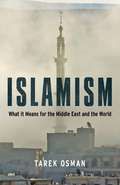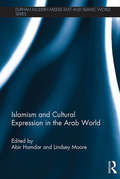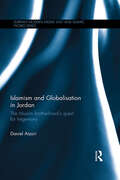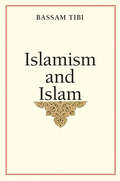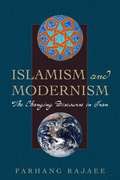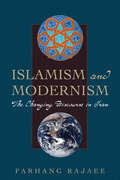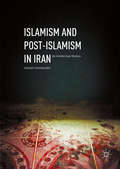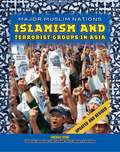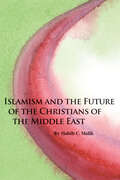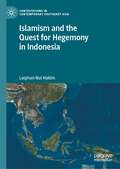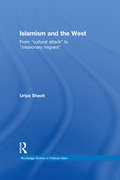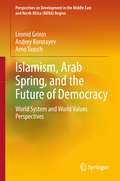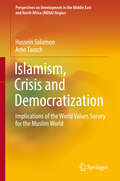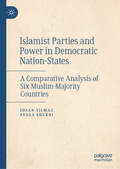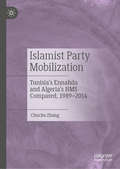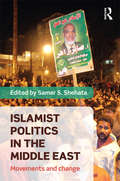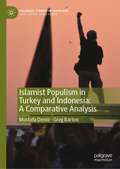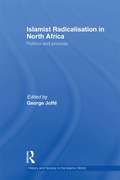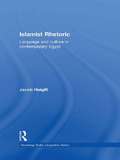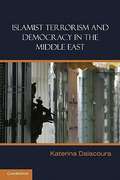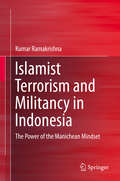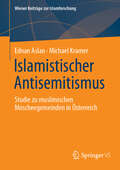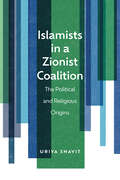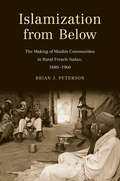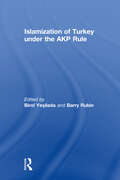- Table View
- List View
Islamism
by Tarek OsmanA political, social, and cultural battle is currently raging in the Middle East. On one side are the Islamists, those who believe Islam should be the region's primary identity. In opposition are nationalists, secularists, royal families, military establishments, and others who view Islamism as a serious threat to national security, historical identity, and a cohesive society. This provocative, vitally important work explores the development of the largest, most influential Islamic groups in the Middle East over the past century. Tarek Osman examines why political Islam managed to win successive elections and how Islamist groups in various nations have responded after ascending to power. He dissects the alliances that have formed among Islamist factions and against them, addressing the important issues of Islamism's compatibility with modernity, with the region's experiences in the twentieth century, and its impact on social contracts and minorities. He explains what Salafism means, its evolution, and connections to jihadist groups in the Middle East. Osman speculates on what the Islamists' prospects for the future will mean for the region and the rest of the world. "
Islamism and Cultural Expression in the Arab World (Durham Modern Middle East and Islamic World Series)
by Abir Hamdar Lindsey MooreWhereas most studies of Islamism focus on politics and religious ideology, this book analyses the ways in which Islamism in the Arab world is defined, reflected, transmitted and contested in a variety of creative and other cultural forms. It covers a range of contexts of production and reception, from the early twentieth century to the present, and with reference to cultural production in and/or about Morocco, Algeria, Tunisia, Egypt, Yemen, the Gulf, Lebanon and Israel/Palestine. The material engaged with is produced in Arabic, English and French and includes fiction, autobiography, feature films, television series, television reportage, the press, rap music and video games. Throughout, the book highlights the multiple forms and contested interpretations of Islamism in the Arab world, exploring trends and tensions in the ways Islamism is represented to (primarily) Arab audiences and complicating simplistic perspectives on this phenomenon. The book considers repeated and idiosyncratic themes, modes of characterisation, motifs, structures of feeling and forms of engagement, in the context of an ongoing struggle for symbolic power in the region.
Islamism and Globalisation in Jordan: The Muslim Brotherhood's Quest for Hegemony (Durham Modern Middle East and Islamic World Series)
by Daniel AtzoriThis book explores the activities of the local Muslim Brotherhood in Jordan. It examines how the Brotherhood, working to establish an alternative social, political and moral order through a network of Islamic institutions, made a huge contribution to the transformation of Jordanian society. It reveals, however, that the Brotherhood’s involvement in the economic realm, in Islamic financial activities, led it to engage with the neo-liberal approach to the economy, with the result that the Islamic social institutions created by the Brotherhood, such as charities, lost their importance in favour of profit-oriented activities owned by leading Islamist individuals. The book thereby demonstrates the "hybridisation" of Islamism, and argues that Islamism is not an abstract set of beliefs, but rather a collection of historically constructed practices. The book also illustrates how globalisation is profoundly influencing culture and society in the Arab world, though modified by the adoption of an Islamic framework.
Islamism and Islam
by Bassam TibiDespite the intense media focus on Muslims and their religion since the tragedy of 9/11, few Western scholars or policymakers today have a clear idea of the distinctions between Islam and the politically based fundamentalist movement known as Islamism. In this important and illuminating book, Bassam Tibi, a senior scholar of Islamic politics, provides a corrective to this dangerous gap in our understanding. He explores the true nature of contemporary Islamism and the essential ways in which it differs from the religious faith of Islam. Drawing on research in twenty Islamic countries over three decades, Tibi describes Islamism as a political ideology based on a reinvented version of Islamic law. In separate chapters devoted to the major features of Islamism, he discusses the Islamist vision of state order, the centrality of antisemitism in Islamist ideology, Islamism's incompatibility with democracy, the reinvention of jihadism as terrorism, the invented tradition of shari'a law as constitutional order, and the Islamists' confusion of the concepts of authenticity and cultural purity. Tibi's concluding chapter applies elements of Hannah Arendt's theory to identify Islamism as a totalitarian ideology.
Islamism and Modernism
by Farhang RajaeeWhile many previous books have probed the causes of Iran's Islamic Revolution of 1979, few have focused on the power of religion in shaping a national identity over the decades leading up to it. Islamism and Modernism captures the metamorphosis of the Islamic movement in Iran, from encounters with Great Britain and the United States in the 1920s through twenty-first-century struggles between those seeking to reform Islam's role and those who take a hardline defensive stance. Capturing the views of four generations of Muslim activists, Farhang Rajahee describes how the extremism of the 1960s brought more confidence to concerned Islam-minded Iranians and radicalized the Muslim world while Islamic alternatives to modernity were presented. Subsequent ideologies gave rise to the revolution, which in turn has fed a restructuring of Islam as a faith rather than as an ideology. Presenting thought-provoking discussions of religious thinkers such as Ha'eri, Burujerdi, Bazargan, and Shari'ati, along with contemporaries such as Kadivar, Soroush, and Shabestari, the author sheds rare light on the voices fueling contemporary Islamic thinking in Iran. A comprehensive study of these interwoven aspects of politics, religion, society, and identity, Islamism and Modernism offers crucial new insight into the aftermath of the Iranian Constitutional Revolution fought one hundred years ago--and its ramifications for the newest generation to face the crossroads of modernity and Islamic discourse in modern Iran today.
Islamism and Modernism: The Changing Discourse in Iran (CMES Modern Middle East Series #24)
by Farhang RajaeeWhile many previous books have probed the causes of Iran’s Islamic Revolution of 1979, few have focused on the power of religion in shaping a national identity over the decades leading up to it. Islamism and Modernism captures the metamorphosis of the Islamic movement in Iran, from encounters with Great Britain and the United States in the 1920s through twenty-first-century struggles between those seeking to reform Islam’s role and those who take a hardline defensive stance. Capturing the views of four generations of Muslim activists, Farhang Rajaee describes how the extremism of the 1960s brought more confidence to concerned Islam-minded Iranians and radicalized the Muslim world while Islamic alternatives to modernity were presented. Subsequent ideologies gave rise to the revolution, which in turn has fed a restructuring of Islam as a faith rather than as an ideology. Presenting thought-provoking discussions of religious thinkers such as Ha’eri, Burujerdi, Bazargan, and Shari‘ati, along with contemporaries such as Kadivar, Soroush, and Shabestari, the author sheds rare light on the voices fueling contemporary Islamic thinking in Iran. A comprehensive study of these interwoven aspects of politics, religion, society, and identity, Islamism and Modernism offers crucial new insight into the aftermath of the Iranian Constitutional Revolution fought one hundred years ago—and its ramifications for the newest generation to face the crossroads of modernity and Islamic discourse in modern Iran today.
Islamism and Post-Islamism in Iran
by Yadullah ShahibzadehThis book is a study of overlooked themes in Iran's contemporary political and intellectual history. It investigates the way Iranian Muslim intellectuals have discussed politics and democracy. As a history of Iranian Islamism and its transformation to post-Islamism, this work demonstrates that Muslim intellectuals have enriched the Iranian society epistemologically, aesthetically, ethically, and politically. This book examines the internal conflicts of the Islamist ideology as the intellectual underpinnings of the 1979 Revolution, its contribution to the formation of the post-revolutionary state, and the post-Islamist response to the democratic deficits of the post-revolutionary state. Seeking to overcome the shortcomings of historiographical approaches, this book demonstrates the intellectual and political agency of Muslim intellectuals from the 1960s to the present.
Islamism and Terrorist Groups in Asia
by Michael RaduMany Americans associate Islam-and Islamist terrorism-exclusively with the greater Middle East. Yet the countries with the largest Muslim populations are actually located in Asia, where Islamic extremism is also a significant and growing concern. This volume provides essential background and surveys recent trends. It examines a variety of homegrown Asian terrorist groups, detailing their goals, methods, and links with international organizations such as al-Qaeda. It also outlines the options available to U.S. policymakers and to Asian governments as they attempt to stem the tide of militant Islam.
Islamism and the Future of the Christians of the Middle East
by Habib C. MalikThis is a sobering account of the ordeal of Christian Arabs of the Middle East in this era of Islamist radicalism. Although those Christians are leaving their homelands in record numbers, the author laments, the powers of the West have shown little interest in their fate.
Islamism and the Quest for Hegemony in Indonesia (Contestations in Contemporary Southeast Asia)
by Luqman Nul HakimThis book examines the failure of Islamic politics in becoming a hegemonic force in Indonesia and the far-reaching consequences for current practices of democracy and of Islam itself. In contrast to the thesis of compatibility between Islam and democracy following the dominant discourse of the Global War on Terror (GWOT) and neoliberal democracy, this study situates Islamic politics in broader social settings by examining its nature and trajectories throughout Indonesia’s modern political history. The book thus investigates how the practices of Islamic politics, or Islamism, have shaped and been transformed through political contestations and the formation of coalitions of multiple forces in constructing Indonesia’s socio-political landscape.Using the concept of hegemony from poststructuralist discourse theory, the analytical framework applied in this book goes beyond liberal epistemologies of Islamism that prescribe the separation of religion from politics and treat Islamism as an object of intervention. Instead, the book is premised on the contention that Indonesia is a political construction, in which Islam has become one of the major discourses that have defined and transformed Indonesia’s nation-state throughout history. In this view, it is argued that the nature and dynamics of Islamism are not driven primarily by different interpretations of religious doctrines, cultural norms or by the imperative of institutions. Rather, the struggles of different Islamist projects in their quest for hegemony are contingent on the outcomes of socio-political changes and contestations that involve multiple political forces, both within and beyond the Islamists, in specific historical conjunctures.
Islamism and the West: From "Cultural Attack" to "Missionary Migrant" (Routledge Studies in Political Islam)
by Uriya ShavitOffering a unique analysis of Islamist ideology, Islamism and the West attempts to explain how- and why-mainstream Islamist leaders have, for the past century, developed and canonized theories which depict theWest as engaged in a sophisticated conspiracy to undermine Muslim identity by cultural means, while morallycollapsing and yearning for the spiritual salvation brought by Muslim migrants. This book demonstrates how seemingly triumphalist Islamist writings served, in fact, to legitimize pragmatic concessions undertaken by Islamists – from cooperating with regimes allied with the West, to encouraging Muslim migration to Christian lands. Following the Arab Spring, and with Islamism becoming a dominant force in Middle Eastern politics, Islamism and the West is an essential reading for the understanding of a region in transition Providing new insights on familiar concepts including ‘cultural imperialism,’ ‘liberal democracy,’ and ‘civilisational decline,’ this book will be of use to students of Middle Eastern and Islamic Studies, Political Science, Migration Studies and Cultural Studies.
Islamism, Arab Spring, and the Future of Democracy: World System and World Values Perspectives (Perspectives on Development in the Middle East and North Africa (MENA) Region)
by Leonid Grinin Andrey Korotayev Arno TauschThis book provides an in-depth analysis of public opinion patterns among Muslims, particularly in the Arab world. On the basis of data from the World Values Survey, the Arab Barometer Project and the Arab Opinion Index, it compares the dynamics of Muslim opinion structures with global publics and arrives at social scientific predictions of value changes in the region. Using country factor scores from a variety of surveys, it also develops composite indices of support for democracy and a liberal society on a global level and in the Muslim world, and analyzes a multivariate model of opinion structures in the Arab world, based on over 40 variables from 12 countries in the Arab League and covering 67% of the total population of the Arab countries. While being optimistic about the general, long-term trend towards democracy and the resilience of Arab and Muslim civil society to Islamism, the book also highlights anti-Semitic trends in the region and discusses them in the larger context of xenophobia in traditional societies. In light of the current global confrontation with radical Islamism, this book provides vital material for policy planners, academics and think tanks alike.
Islamism, Crisis and Democratization: Implications of the World Values Survey for the Muslim World (Perspectives on Development in the Middle East and North Africa (MENA) Region)
by Hussein Solomon Arno TauschThis book systematically assesses the value systems of active Muslims around the globe. Based on a multivariate analysis of recent World Values Survey data, it sheds new light on Muslim opinions and values in countries such as Indonesia, Iran, Tunisia, Egypt and Turkey. Due to a lack of democratic traditions, sluggish economic growth, escalating religiously motivated violence, and dissatisfaction with ruling elites in many Muslim countries, the authors identify a crisis and return to conservative values in the Muslim world, including anti-Semitism, religious and sexual intolerance, and views on democracy and secularism, business and economic matters. Based on these observations, they offer recommendations for policymakers and civil societies in Muslim countries on how to move towards tolerance, greater democratization and more rapid economic growth.
Islamist Parties and Power in Democratic Nation-States: A Comparative Analysis of Six Muslim-Majority Countries
by Ihsan Yilmaz Syaza ShukriBy exploring the trajectories of Islamist parties in six diverse countries (Turkey, Morocco, Tunisia, Pakistan, Indonesia, and Malaysia), this book provides a comparative analysis of the strategies employed by Islamist groups to confront established political structures through electoral processes and their subsequent governance practices if and when they assume power. The latter aspect is less explored than the predominant focus on Islamist opposition movements. The book analyses how these Islamist political parties navigate and negotiate with oppositional forces and establishments, concisely discussing the complex dynamics at play within each country. The book also bridges the gap between North Africa, South Asia, Southeast Asia, and Asia Minor, providing a comparative analysis across regions. Primarily serving as an introductory text to the subject of Islamist parties, the book functions as a comprehensive reader and handbook. Each chapter covers a range of key issues and themes relevant to the governance and political activities of the Islamist party of the country studied in the chapter, offering a general overview of Islamist party experiences across various themes and different historical periods.
Islamist Party Mobilization: Tunisia’s Ennahda and Algeria’s HMS Compared, 1989–2014
by Chuchu ZhangThis book aims to explore how Islamist parties mobilize debates, discourses, and environments in electoral authoritarian systems. Interrelating three theoretical schools, Electoral Authoritarianism Theory, Protest Voting Theory, and Political Process Theory, it adopts and expands on a demand-and-supply framework to approach the subject in a novel way, and adapts them to address North Africa, a region in which such theoretical scholarship has until now not been conducted. In-depth case studies focus on two Islamist parties in North Africa, Tunisia’s Ennahda and Algeria’s HMS, both of which adopted the Muslim Brotherhood model, had charismatic leaders, and were active in the political scene from 1989-2014, the period between their first electoral trial and their electoral participation after taking part in governance. The chapters proceed chronologically, providing a historical treatment of the evolution of Ennahda and the HMS since their inception and addressing their development in two and a half decades.
Islamist Politics in the Middle East: Movements and Change
by Samer S. ShehataFor over three decades, Islamist politics, or political Islam, has been one of the most dynamic and contentious political forces in the Middle East. Although there is broad consensus on the importance of political Islam, there is far less agreement on its character, the reasons for Islamist’s success, the role of Islamist movements in domestic and international affairs, or what these movements portend for the future. This volume addresses a number of central questions in the study of Islamist politics in the Middle East through detailed case studies of some of the region’s most important Islamist movements. Chapters by leading scholars in the field examine the Egyptian Muslim Brotherhood, Hamas, Hizbullah, Morocco’s Justice and Benevolence, the Jordanian Muslim Brotherhood, the Sunni Insurgency in Iraq and Islamist politics in Turkey and Iran. The topics addressed within this volume include social networks and social welfare provision, Islamist groups as opposition actors, Islamist electoral participation, the intersection of Islam and national liberation struggles, the role of religion in Islamist politics, and Islam and state politics in Iran, among other topics. All of the contributing authors are specialists with deep knowledge of the subject matter who are committed to empirically based research. These scholars take Islamists seriously as modern, sophisticated, and strategic political players. Together, their work captures much of the diversity of Islamist politics in the region and will contribute to the scholarship on a topic that continues to be important for the Middle East and the world.
Islamist Populism in Turkey and Indonesia: A Comparative Analysis (Palgrave Studies in Populisms)
by Greg Barton Mustafa DemirThis book focuses on the dynamics of democracy and populism in Muslim-majority countries, such as Turkey and Indonesia. It does so by examining the complexities of democratic development in these areas, ranging from 'flawed' to 'hybrid' regimes. Despite the aspirations for democratic progress, recent democracy indices reveal a concerning trend of backsliding, particularly in the last decade. This regression can be attributed, in part, to the ascendancy of populist politics.Populist movements have adeptly exploited both real and perceived cultural insecurities to acquire, consolidate, and maintain political power. This phenomenon is especially pronounced in flawed democracies and hybrid regimes within Muslim-majority countries, such as Turkey and Indonesia. Notably, religion, specifically Islam, has emerged as a central tool within the populist playbook. Populist actors have constructed a religious-civilizational framework that leverages political binaries, manipulates insecurities, and fosters traditional anti-elite and anti-'other' sentiments. In this book, the authors advance the notion that populism is a multifaceted phenomenon that relies on various pre-existing fractures within societies and cultures. Once in power, populism intensifies these differences to further consolidate its position, utilizing various state apparatuses such as state-controlled religious institutions. This comprehensive analysis offers insights into the growing trend of populism in the Muslim world and its impact on contemporary politics.
Islamist Radicalisation in North Africa: Politics and Process (History and Society in the Islamic World)
by George JofféIn the current climate of political extremism and violence, much attention has been directed towards "radicalisation" as the reasons behind such courses of action, along with a conviction that those who are radicalised represent an irrational deviation from the conventionally accepted norms of social and political behaviour. This book focuses on the current issues and analytical approaches to the phenomenon of radicalisation in North Africa. Taking a comprehensive approach to the subject, it looks at the processes that lead to radicalisation, rather than the often violent outcomes. At the same time, chapters expand the discussion historically and conceptually beyond the preoccupations of recent years, in order to develop a more holistic understanding of a complex individual and collective process that has represented a permanent challenge to dominant political, social and, on occasion, economic norms. With contributions from academics and policy-makers within and outside the region, the book is a comprehensive investigation of Islamist Radicalisation. As such, it will be of great interest to academics and students investigating North Africa and terrorism, as well as specialists in radicalism and extremism.
Islamist Rhetoric: Language and Culture in Contemporary Egypt (Routledge Arabic Linguistics Series)
by Jacob HoigiltIslamism in Egypt is more diversified in terms of its sociology and ideology than is usually assumed. Through linguistic analysis of Islamist rhetoric, this book sheds light upon attitudes towards other Muslims, religious authority and secular society. Examining the rhetoric of three central Islamist figures in Egypt today - Yusuf al-Qaradawi, Amr Khalid and Muhammad Imara - the author investigates the connection between Islamist rhetoric and the social and political structures of the Islamic field in Egypt. Highlighting the diversity of Islamist rhetoric, the author argues that differences of form disclose sociological and ideological tensions. Grounded in Systemic Functional Grammar, the book explores three linguistic areas in detail: pronoun use, mood choices and configurations of processes and participants. The author explores how the writers relate to their readers and how they construe concepts that are central in the current Islamic revival, such as ‘Islamic thought’, ‘Muslims’, and ‘the West’. Introducing an alternative divide in Egyptian public debate - between text cultures rather than ideologies - this book approaches the topic of Islamism from a unique analytical perspective, offering an important addition to the existing literature in the areas of Middle Eastern society and politics, Arabic language and religious studies.
Islamist Terrorism and Democracy in the Middle East
by Katerina DalacouraWhat were the reasons behind the terrorist attacks of September 11th? Does the cause of Islamist terrorism relate to the lack of democracy in the Middle East? Through detailed research into the activities of both radical and moderate organizations across the Middle East, such as the Muslim Brotherhood, Hamas and Hizbullah, and via interviews with key personnel, Katerina Dalacoura investigates whether repression and political exclusion pushed Islamist entities to adopt terrorist tactics. She also explores whether inclusion in the political process has had the opposite effect of encouraging Islamist groups toward moderation and ideological pragmatism. In a challenge to the conventional wisdom, she concludes that Islamist terrorism is not a direct consequence of authoritarianism in the Middle East and that there are many key factors that generate radicalism.
Islamist Terrorism and Militancy in Indonesia
by Kumar RamakrishnaDrawing upon insights from the natural and social sciences, this book puts forth a provocative new argument that the violent Islamist threat in Indonesia today derives its stubborn resilience from being in essence a complex, adaptive and self-organizing system - or what some specialists might even call a super-organism. The book challenges the popular assumption that ideology is the root cause that explains why Indonesian Islamists radicalize into violent extremism. In addition it addresses why despite years of intense security force pressure, seemingly disparate militant cells keep 'popping up' like the proverbial hydra - and in the apparent absence of a centralized coordinating body, nevertheless appear to display an organic interconnectivity with one another. Going beyond standard ideological mantras the book argues that fresh inter-disciplinary thinking is needed to cope with the constantly mutating violent Islamist challenge in Indonesia, and puts forth a comprehensive strategy for doing so. It will be of interest to academics and students of terrorism, religion and violence in the Southeast Asian region.
Islamistischer Antisemitismus: Studie zu muslimischen Moscheegemeinden in Österreich (Wiener Beiträge zur Islamforschung)
by Michael Kramer Ednan AslanDie Zunahme antisemitischer Vorfälle in Europa hat durch die neue Zuwanderung aus islamischen Ländern in Europa eine neue Dimension erreicht. In den medialen Debatten wird immer wieder auf die Rolle von Imamen oder praktizierenden Muslim*innen in den Fokus der öffentlichen Debatte gerückt. Dieses Buch geht auf die theologischen und historischen Hintergründe der jüdisch-muslimischen Beziehungen ein und untersucht mögliche antisemitische Hintergründe der aktuellen antisemitischen Ausschreitungen in Europa, aber auch in islamischen Ländern. Dazu wurden am Beispiel Österreichs mit Imamen und Moscheebesucher*innen gesprochen und ihre Aussagen analysiert.
Islamists in a Zionist Coalition: The Political and Religious Origins
by Uriya ShavitIslamists in a Zionist Coalition: The Political and Religious Origins explores the decision made in 2021 by the United Arab List, the political arm of the Southern Branch of the Islamic Movement in Israel (SIM), to join the Israeli Zionist coalition for the first time, and specifically how and why it was possible for an Islamist movement to become the enabler of a Zionist government without losing the support of its religious scholars or political base. Through analyses of hundreds of books, columns, fatwas, media interviews, and posts on social media, as well as interviews conducted by the author with all the living leaders of the SIM and the United Arab List, Uriya Shavit demonstrates that the Islamic premises on which the SIM operates, rather than limit the party's flexibility, made it possible for the United Arab List to advance a pragmatic political agenda. This book argues that while the decision of the United Arab List to join a Zionist coalition led to dramatic consequences, it was grounded in decades of religious writings that prepared the ground for its legitimization, and aligned with a political orientation with which significant segments of the Arab population identified since the founding of the modern state of Israel.
Islamization from Below
by Brian J. PetersonThe colonial era in Africa, spanning less than a century, ushered in a more rapid expansion of Islam than at any time during the previous thousand years. In this groundbreaking historical investigation, Brian J. Peterson considers for the first time how and why rural peoples in West Africa "became Muslim" under French colonialism. Peterson rejects conventional interpretations that emphasize the roles of states, jihads, and elites in "converting" people, arguing instead that the expansion of Islam owed its success to the mobility of thousands of rural people who gradually, and usually peacefully, adopted the new religion on their own. Based on extensive fieldwork in villages across southern Mali (formerly French Sudan) and on archival research in West Africa and France, the book draws a detailed new portrait of grassroots, multi-generational processes of Islamization in French Sudan while also deepening our understanding of the impact and unintended consequences of colonialism.
Islamization of Turkey under the AKP Rule
by Barry Rubin Birol YeşiladaThis book examines the decade in office of the Justice and Development Party (AKP) and its efforts to transform the Turkish republic toward a more Islamist-oriented system. If it succeeds, Turkey’s dramatic shift will be the most important change in the Middle East power balance since the 1979 Iranian revolution and will have equally devastating effects on Western interests.For more than 80 years Turkey has been ruled by the secular democratic structures created by Kemal Ataturk. Now, however, the rise of the Justice and Development Party (AKP) and its series of electoral victories are creating a new system. Whilst portraying itself as a centre-right reform party, the AKP has been accused of having an Islamist agenda. After almost a decade in power, there is serious evidence that this claim is true. At home, the AKP has been changing basic Turkish attitudes and institutions, from buying up a large portion of the country’s media to revising its laws, and even taking the lead in the writing of a new constitution. Internationally, Turkey has moved away from the West and Israel toward Iran and radical Islamist groups. While its intentions—and ability to fulfil them—are still unclear, the AKP has been leading the most important transformation of Turkey since the formation of the republic after World War I. This book systematically examines the AKP’s ideology, support base, actions in office, and goals.This book was published as a special issue of the Turkish Studies.
